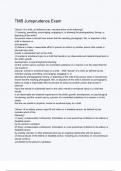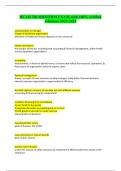TMB Jurisprudence Exam
"Abuse" of a child, as defined by law, includes which of the following?
(1) causing, permitting, encouraging, engaging in, or allowing the photographing, filming, or
depicting of the child if
the person knew or should have known that the resulting photograph, film, or depiction of the
child is obscene or
pornographic;
(2) failure to make a reasonable effort to prevent an action by another person that results in
physical injury that
results in substantial harm to the child;
(3) mental or emotional injury to a child that results in an observable and material impairment in
the child's growth,
development, or psychological functioning;
(4) the current use by a person of a controlled substance in a manner or to the extent that the
use results in
physical, mental or emotional injury to a child. - ANS-"Abuse" of a child, as defined by law,
includes causing, permitting, encouraging, engaging in, or
allowing the photographing, filming, or depicting of the child if the person knew or should have
known that the resulting photograph, film, or depiction of the child is obscene or pornographic;
failure to make a reasonable effort to prevent an action by another person that results in
physical
injury that results in substantial harm to the child; mental or emotional injury to a child that
results
in an observable and material impairment in the child's growth, development, or psychological
functioning; and the current use by a person of a controlled substance in a manner or to the
extent
that the use results in physical, mental or emotional injury to a child.
"Abuse" of an elderly person (age 65 and older) or a disabled person, as defined by law,
includes which of the
following?
(1) injury, unreasonable confinement, intimidation or cruel punishment inflicted on the elderly or
disabled person
by the person's caretaker;
(2) injury, unreasonable confinement, intimidation or cruel punishment inflicted on the elderly or
disabled person
by a family member or other individual who has an ongoing relationship with the person;
(3) sexual abuse of the elderly or disabled person, including any involuntary or nonconsensual
sexual conduct,
committed by the person's caretaker;
,(4) sexual abuse of the elderly or disabled person, including any involuntary or nonconsensual
sexual conduct,
committed by a family member or other individual who has an ongoing relationship with the
person. - ANS-"Abuse" of an elderly person (age 65 and older) or a disabled person, as defined
by law, includes
injury, unreasonable confinement, intimidation or cruel punishment inflicted on the elderly or
disabled person by the person's caretaker; injury, unreasonable confinement, intimidation or
cruel
punishment inflicted on the elderly or disabled person by a family member or other individual
who
has an ongoing relationship with the person; sexual abuse of the elderly or disabled person,
including any involuntary or nonconsensual sexual conduct, committed by the person's
caretaker;
and sexual abuse of the elderly or disabled person, including any involuntary or nonconsensual
sexual conduct, committed by a family member or other individual who has an ongoing
relationship
with the person.
"Neglect" of a child, as defined by law, includes which of the following?
(1) the failure to seek, obtain, or follow through with medical care for a child, with the failure
resulting in or
presenting a substantial risk of death, disfigurement, or bodily injury or with the failure resulting
in an observable
and material impairment to the growth, development, or functioning of the child;
(2) the failure to provide a child with food, clothing, or shelter necessary to enable the child to
participate in school
and other functions and activities at a level equal to the average of other children in the lowest
economic quartile;
(3) the failure to provide a child with food, clothing, or shelter necessary to sustain the life or
health of the child,
excluding failure caused primarily by financial inability unless relief services had been offered
and refused. - ANS-"Neglect" of a child, as defined by law, includes the failure to seek, obtain, or
follow through with
medical care for a child, with the failure resulting in or presenting a substantial risk of death,
disfigurement, or bodily injury or with the failure resulting in an observable and material
impairment
to the growth, development, or functioning of the child and the failure to provide a child with
food,
clothing, or shelter necessary to sustain the life or health of the child, excluding failure caused
primarily by financial inability unless relief services had been offered and refused.
"Neglect" of an elderly person (age 65 and older) or a disabled person, as defined by law,
includes which of the
following?
,(1) failure of a caretaker to provide to the elderly or disabled person the goods or services,
including medical
services, that are necessary to avoid physical or emotional harm or pain;
(2) failure of the elderly or disabled person to provide for him- or herself the goods or services,
including medical
services, that are necessary to avoid physical or emotional harm or pain;
(3) failure of a caretaker to provide to the elderly or disabled person the goods or services,
excluding medical
services, that are necessary to avoid physical or emotional harm or pain. - ANS-"Neglect" of an
elderly person (age 65 and older) or a disabled person, as defined by law, includes
the failure of a caretaker to provide to the elderly or disabled person the goods or services,
including medical services, that are necessary to avoid physical or emotional harm or pain and
the
failure of the elderly or disabled person to provide for him- or herself the goods or services,
including medical services, that are necessary to avoid physical or emotional harm or pain.
A "dangerous drug" includes:
A Only drugs classified as controlled substances by federal or state law;
B All drugs that may only be dispensed by prescription under federal or state law;
C All drugs, other than controlled substances, that may only be dispensed by prescription under
federal
or state law;
D All drugs that have addictive potential or potential for abuse;
None of the above. - ANS-A dangerous drug includes all drugs, other than controlled
substances, that may only be dispensed
by prescription under federal or state law
A person may not practice as a physician assistant in Texas unless the person: - ANS-A person
may not practice as a physician assistant in Texas unless the person is licensed as a
physician assistant in Texas.
A person working in a physician's office may be called a physician assistant only if:
A That is the official job title assigned to his or her position by the physician;
B He or she has completed the equivalent of two years of medical training and are working in
the office
of a physician under the physician's direct and constant supervision;
C He or she holds a physician assistant license issued by the Texas Physician Assistant Board;
D He or she has a medical license from another state or country, or a suspended medical
license from
Texas;
None of the above - ANS-A person working in a physician's office may be called a physician
assistant only if he or she holds
a physician assistant license issued by the Physician Assistant Board.
, A physician assistant has a duty to report relevant information to the Board related to the acts of
another physician assistant in this state in which of the following situations?
A He or she is aware that the physician assistant is of questionable moral character;
B In his or her opinion, the physician assistant is monetarily defrauding the supervising
physician
through inaccurate billing records;
C In his or her opinion, the physician assistant poses a continuing threat to the public welfare
through
practice as a physician assistant;
D In his or her opinion, the physician assistant poses a continuing threat to the public welfare,
unless his
or her contract with the place of employment provides that such reports shall be made only to
the
clinic administrator or the supervising physician;
None of the above. - ANS-A physician assistant has a duty to report relevant information to the
Board related to the acts of
another physician assistant in this state if, in his or her opinion, the physician assistant poses a
continuing threat to the public welfare through practice as a physician assistant.
A physician assistant may call in prescriptions to a pharmacy:
A In his or her own name after consultation with the physician;
B In his or her own name, but only dangerous drugs and only after consultation with the
physician;
C In his or her own name with appropriate delegation by a physician in accordance with a
standing
delegation order;
D Only on behalf of the physician and after consultation with, and as directed by, the physician;
Only for those patients with whom the physician assistant has previously treated. - ANS-A
physician assistant may call in prescriptions to a pharmacy only on behalf of the physician and
after consultation with, and as directed by, the physician
A physician assistant shall inform the Board of address changes:
References: Board Rule 185.6(h)
A Within two weeks of the effective date of the address change;
B At least two weeks before the effective date of the address change;
C Within 30 days of the effective date of the address change;
D Within a reasonable time after the effective date of the address change;
None of the above - ANS-A physician assistant shall inform the Board of address changes
within two weeks of the effective
date of the address change.
A physician assistant shall notify the Board of changes regarding his or her supervising
physician:
References: 204.201, Occ. Code





